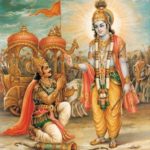
TEXT 13.33-35|| SB 11.19.33-35
śrī-bhagavān uvāca
ahiṁsā satyam asteyam
asaṅgo hrīr asañcayaḥ
āstikyaṁ brahmacaryaṁ ca
maunaṁ sthairyaṁ kṣamābhayam
śaucaṁ japas tapo homaḥ
śraddhātithyaṁ mad-arcanam
tīrthāṭanaṁ parārthehā
tuṣṭir ācārya-sevanam
ete yamāḥ sa-niyamā
ubhayor dvādaśa smṛtāḥ
puṁsām upāsitās tāta
yathā-kāmaṁ duhanti hi
Translation
The Supreme Lord said:
Nonviolence, truthfulness, not usurping others’ property, detachment from worldly association, humility, freedom from possessiveness, faith in the principles of religion, celibacy, silence, steadiness, forgiveness, and fearlessness—these twelve are referred to as yama. External cleanliness, internal cleanliness, chanting the holy names of the Lord, austerity, fire sacrifice, faith, serving guests, worshiping Me, visiting holy places, engaging only in activities that are ultimately beneficial, and service to the spiritual master—these twelve are called niyama. My dear Uddhava, These twenty- four practices bestow all desired benedictions upon those who devotedly cultivate them.
COMMENTARY
In these three verses, the Supreme Lord defines yama and niyama . There are two types of purification—internal and external. By carefully cultivating these twenty-four yama and niyama, all of one’s desires become fulfilled.
PURPORT
The twelve yamas are non-enviousness, remaining fixed in the truth, refraining from stealing another’s property, staying aloof from all kinds of bad association, always attempting to do good to others, renunciation of unnecessary sense enjoyment, unflinching faith in the Supreme Lord, celibacy, giving up idle talks, steadiness in one’s practices, tolerance of others’ offenses, and fear of transgressing the prescribed rules and regulations. The twelve niyamas are external cleanliness such as bathing, internal cleanliness by serving Lord Hari, chanting the holy names of the Lord, observing vows such as Ekadasi, performing sacrifice for the satisfaction of Lord Hari, maintaining faith in the discussions of the glories of Lord Hari, serving the devotees of Lord Hari, worshiping the Deity, traveling to holy places of pilgrimage, engaging in activities meant for one’s ultimate welfare, remaining fixed in observing the codes of proper conduct, being satisfied in all conditions of life, and serving the spiritual master.




